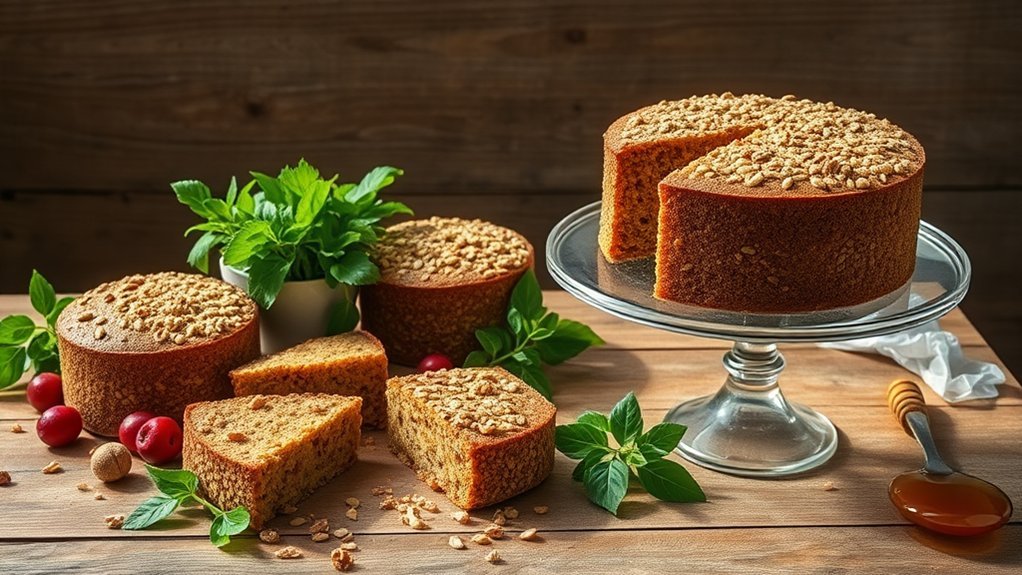How Organic Cakes Support Better Health
Organic cakes contribute to better health by using nutrient-rich ingredients free from synthetic pesticides and harmful chemicals. They typically include whole grains, which are high in fibre and essential nutrients, supporting digestive health. Healthier fats from ingredients like avocados and nuts can lower the risk of heart disease. Furthermore, reduced sugar levels help maintain stable blood sugar. Adding oilseed cakes boosts the nutritional profile, making these treats not only delicious but also beneficial. There's plenty more to explore regarding their health advantages.
Key Takeaways
- Organic cakes are crafted from ingredients that are free from synthetic pesticides, minimising harmful chemical exposure and supporting overall health.
- They often have higher nutrient levels, including antioxidants, which bolster immune function and enhance well-being.
- Whole grains in organic cakes provide vital fibre, aiding digestion and lowering the risk of chronic illnesses.
- Healthier fats used in these cakes can improve heart health by reducing bad cholesterol levels.
- Natural sweeteners and flavouring methods help keep blood sugar levels stable, thereby lowering the risk of diabetes.
The Benefits of Organic Ingredients

Choosing organic ingredients for your baking isn't just a passing trend; it's a step towards a healthier lifestyle. Organic products are grown without synthetic pesticides, reducing your exposure to harmful chemicals. This often results in higher levels of antioxidants and lower nitrate content, which can be better for your health. Plus, when you opt for organic, you know exactly what's in your food, making it easier to make informed choices. Additionally, using organic ingredients allows for healthier choices that can enhance the overall quality and nutritional value of your baked goods. Organic cakes are made from ingredients free of synthetic pesticides and fertilizers, often having higher nutrient content that benefits your well-being.
Organic dairy and meats typically have better fatty acid profiles, which can be beneficial for heart health. By using organic ingredients, you not only improve the flavour and nutritional value of your baked goods but also support sustainable farming practices, which is good for both your health and the environment.
Nutritional Advantages of Whole Grains

Many people overlook the role of whole grains in their diets, but these nutrient-rich foods offer significant health benefits. Whole grains are a fantastic source of fibre, which helps regulate digestion and prevent constipation. Their high fibre content also supports healthy gut bacteria, promoting digestive health. Additionally, whole grains can reduce the risk of chronic diseases by contributing to overall long-term health. Incorporating organic flour options into your meals can help stabilise blood sugar levels, lower cholesterol, and potentially reduce the risk of chronic diseases.
Moreover, whole grains retain more nutrients, such as B vitamins and essential minerals, than refined grains, which often lose these during processing. Incorporating whole grains into your meals can help stabilise blood sugar levels, lower cholesterol, and potentially reduce the risk of chronic diseases.
Healthier Fats for a Healthier Heart

For heart health, prioritising unsaturated fats is essential. These healthier fats, found in foods like avocados and nuts, can lower LDL cholesterol and raise HDL cholesterol, significantly reducing your risk of heart disease. Incorporating healthier fats into your diet can also promote overall well-being by providing essential nutrients. Additionally, organic ingredients typically contain lower pesticide residues, contributing to a healthier eating experience.
Benefits of Unsaturated Fats
Unsaturated fats are vital for a healthy heart, as they help lower bad cholesterol levels and improve overall cardiovascular health. Including foods like nuts, seeds, avocados, and olive oil in your diet can provide significant benefits.
These fats, which include monounsaturated and polyunsaturated types, help reduce LDL cholesterol and manage blood pressure, thus lowering your risk of heart disease.
Research indicates that diets rich in unsaturated fats, like the Mediterranean diet, are linked to fewer cardiovascular problems. Additionally, omega-3 fatty acids found in fish can boost heart health by reducing inflammation.
Choosing unsaturated fats over saturated and trans fats can contribute to a healthier lifestyle.
Reducing Saturated Fat Intake
To keep your heart healthy, it's important to reduce your intake of saturated fats. Consuming too much saturated fat can raise LDL cholesterol levels, which increases the risk of heart disease. Aim to keep saturated fat to less than 10% of your daily calories. You can easily make some baking swaps to cut down on saturated fat while still enjoying tasty treats.
Here's a quick comparison of some alternatives:
| Saturated Fat Source | Saturated Fat Alternatives | Benefits |
|---|---|---|
| Butter | Olive oil | Lower in saturated fats |
| Whole milk | Almond milk | Fewer calories |
| Red meat | Lean poultry | Heart-healthy protein |
| Cream | Greek yogurt | Nutrient-rich option |
Reducing Sugar for Better Health

Cutting back on sugar not only benefits your health but also boosts the flavours of your organic cakes.
Consider using healthier sweetening alternatives to keep things sweet without causing spikes in your blood sugar levels.
Techniques like using spices or fruit purées can make your treats just as delightful while supporting a balanced diet.
Healthier Sweetening Alternatives
If you're looking for healthier ways to sweeten your baked goods, consider natural sweeteners like coconut sugar and honey. These alternatives not only lower sugar content but also provide extra nutrients and antioxidants, enhancing flavour while helping to reduce overall sugar intake.
| Natural Sweetener | Key Benefits |
|---|---|
| Coconut Sugar | Lower glycaemic index than refined sugar |
| Honey | Packed with antioxidants and nutrients |
| Maple Syrup | Contains beneficial minerals and antioxidants |
| Fruit Purees | Adds natural sweetness and moisture |
Using these natural options can be a simple yet effective way to create delicious and healthier treats.
Impact on Blood Sugar
Enjoying a slice of cake can be a treat, but it's important to grasp its impact on blood sugar for better health. Cakes generally have a medium glycemic index, which can cause moderate spikes in blood sugar levels.
To improve blood sugar management, consider using whole grains, fibre-rich ingredients, and natural sweeteners. For example, opting for almond or coconut flour instead of refined white flour can lower the glycemic index. Adding ground flaxseeds or chia seeds increases fibre content, which helps slow down sugar absorption.
You might also try reducing conventional sugar and using puréed fruits for sweetness, benefiting your health. By making mindful choices, you can enjoy cake while helping to maintain stable blood sugar levels, which can lower the risk of diabetes and heart disease.
Flavor Enhancement Techniques
Managing blood sugar levels doesn't mean you have to give up on flavour. You can enjoy delicious organic cakes by using effective flavour enhancement techniques that cut down on sugar without sacrificing taste.
By incorporating natural flavour enhancers, you can elevate your baking.
- Fruit Extracts: Naturally boost sweetness without added sugar.
- Citrus Acids: Add a tangy kick to balance sweetness.
- Spices: Introduce depth and warmth, reducing the need for sugar.
These techniques create a healthier dessert experience.
For example, using applesauce or yoghurt can enhance moisture while lowering sugar content.
Embrace these flavour balancing methods and you'll find your cakes just as delightful, if not more so, with fewer sugar-related health concerns.
Enjoy your flavourful baking journey!
Enhancing Nutrition With Superfoods

Incorporating superfoods into your diet can significantly boost your nutritional intake and offer numerous health benefits. Combinations like salmon and spinach not only enhance your meal's nutritional profile but also help retain nutrients when cooked correctly.
Foods such as blueberries and kale are rich in antioxidants that protect your cells, while nuts and seeds supply essential minerals and plant-based protein. Whole grains and leafy greens provide dietary fibre, which aids digestion and keeps you feeling full.
Choosing whole superfoods over supplements maximises these advantages, and frozen options can maintain their nutritional value when fresh produce isn't available. By adding a variety of superfoods to your meals and snacks, you can support your overall health and well-being.
The Role of Oilseed Cakes in Modern Baking

As you delve into modern baking, you'll discover that oilseed cakes are vital for enhancing both the nutritional value and functionality of your baked goods.
Here are some key benefits of incorporating them into your recipes:
- High in Protein and Fibre: Oilseed cakes boost nutrition and improve texture, making them ideal for a variety of baked items.
- Moisture Retention: Their ability to retain water helps extend shelf life and improve product quality.
- Nutrient Fortification: They offer essential vitamins, minerals, and healthy fats that contribute to overall wellbeing.
These advantages make oilseed cakes a worthwhile addition, whether you're baking bread, gluten-free treats, or desserts.
Sustainability and Its Impact on Health

Sustainability is vital for creating healthier food systems, particularly through organic practices. By embracing sustainable methods, you benefit both the environment and your own health. Here's how:
| Sustainable Practices | Health Benefits |
|---|---|
| Reduces chemical exposure | Lowers the risk of health problems |
| Enhances soil fertility | Increases the nutritional value of food |
| Promotes biodiversity | Strengthens local food systems |
| Reduces greenhouse gas emissions | Helps alleviate climate-related health risks |
Choosing organic farming not only safeguards the planet but also provides you with fresher, nutrient-dense foods. This link between sustainability and health creates a healthier ecosystem for all.
Consumer Preferences for Healthier Options

With rising health consciousness, many consumers are increasingly seeking healthier food options, particularly in baked goods. This shift reflects current health trends that prioritise clean, organic ingredients.
Here are some key points:
- 62% of consumers emphasise healthfulness when making food choices.
- 50% of Brits actively search for healthier snacks.
- 65% prefer organic cakes to avoid synthetic chemicals.
These figures indicate a strong demand for nutritious options, especially among younger generations like Millennials and Gen Z.
As awareness of dietary health impacts grows, businesses must adapt to these preferences, ensuring that healthier choices aren't only available but also tasty and appealing.
Overcoming Challenges in Organic Baking

The demand for organic cakes is on the rise, but bakers face several challenges that can complicate their operations. Sourcing organic ingredients can be tricky due to their limited availability and higher costs, which can squeeze production budgets and profit margins.
For instance, organic grains can be 25% to over twice the price of conventional ones. Finding reliable suppliers is crucial for consistency in your products.
Additionally, there are technological challenges to consider, such as the need for precise baking conditions to ensure product quality and avoid contamination.
Navigating certification requirements can also be complex, yet compliance is essential for maintaining your business's reputation.
Frequently Asked Questions
Are Organic Cakes Suitable for People With Food Allergies?
Organic cakes can be a good option for those with food allergies, particularly when they are made with allergy-friendly ingredients and gluten-free alternatives. However, it's essential to check labels and consult bakers about cross-contamination and specific allergens before making a purchase. For instance, if you have a nut allergy, ensure the cake is made in a nut-free environment. Always prioritise your safety by asking the right questions.
How Do Organic Cakes Compare in Taste to Traditional Cakes?
When comparing the taste of organic cakes to traditional ones, many people find that organic cakes often offer a richer flavour. For instance, the use of natural ingredients like free-range eggs and organic fruit can result in a fresher and more authentic taste. This can make a simple sponge cake feel more vibrant and satisfying. Overall, those who prefer organic options often claim they taste better and are worth the extra effort.
Can I Find Organic Cakes in Regular Grocery Stores?
You can find organic cakes in regular supermarkets like Waitrose and Sainsbury's. These stores typically offer organic options, giving you access to quality baked goods made with natural ingredients that suit various dietary needs.
What Is the Shelf Life of Organic Cakes?
The shelf life of organic cakes can differ quite a bit. Frosted cakes typically last 3 to 5 days at room temperature, whereas plain sponge cakes can last up to a week. The ingredients used are key to how long they stay fresh. For example, cakes made with fresh fruits may spoil faster than those made with drier ingredients.
Are Organic Cakes More Expensive Than Conventional Cakes?
When comparing organic cakes to conventional ones, you'll notice a notable difference in price, primarily due to the cost of organic ingredients. Generally, organic cakes are more expensive, but this price gap is beginning to close as demand rises and more private-label options are introduced. For example, a standard chocolate cake might cost around £5, while an organic version could be priced at £7, but with increasing availability, you might find organic options for closer to £6.
Conclusion
In conclusion, choosing organic cakes is not just a delightful treat; it's a choice for better health. Studies indicate that organic ingredients can boost nutrition and minimise harmful additives, making your dessert choices wiser. By selecting whole grains, healthier fats, and superfoods, you can satisfy your sweet cravings while also supporting your overall well-being. So, the next time you indulge, remember: your cake can be both tasty and nutritious—proving that you can enjoy your cake and eat it too!







